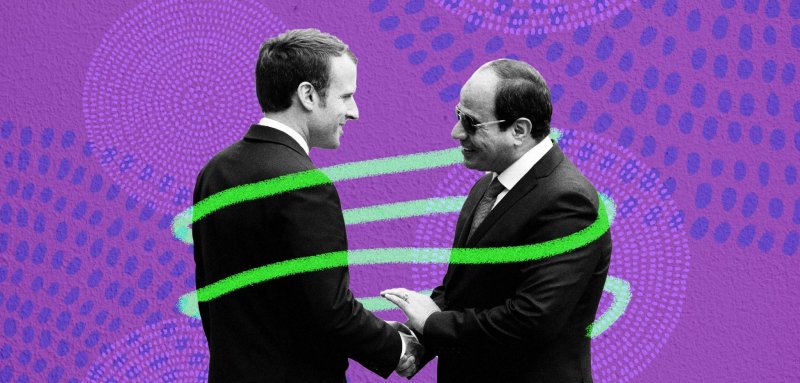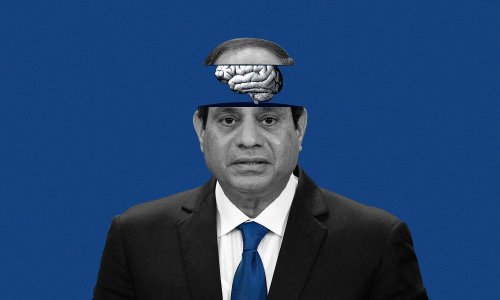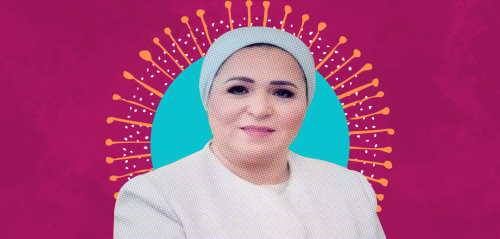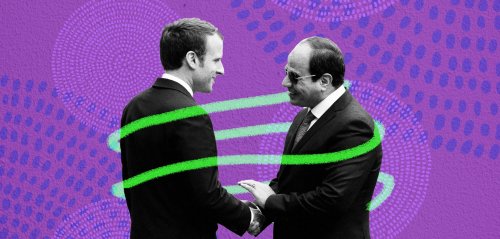"I will not make matters of military defense and economic cooperation conditional upon these [human rights] disagreements... I think it is more effective to have a policy of demanding dialogue than a policy of boycott, which would only reduce the effectiveness of one of our partners in the fight against terrorism and for regional stability.”
This was an excerpt from a statement made by French President Emmanuel Macron on Monday Dec 7th, 2020 at a joint press conference with the Egyptian President Abdel Fattah al-Sisi at the Élysée presidential palace in the French capital Paris.
La Republique decorates a dictator for it considers Egypt a strategic ally against the ‘Turkish threat’”
Preceded by an official welcome parade on Monday in recognition of the first Arab president to visit Paris after the recent strained polemics with the Muslim world, this much-needed gift provided by the French President to his guest – just a few weeks before US President Donald Trump leaves office – comes following what the French president described as an anti-French "hate campaign" (in reference to the boycott of French goods in parts of the Muslim world after cartoons of the Prophet Mohammed were published). It also coincides with French anger over Cairo’s record of human rights violations, with 17 French and international human rights groups signing a joint statement accusing the French administration of turning a blind eye to Sisi's increasing freedom violations. Executive director of the Human Rights Watch Kenneth Roth sees that “Sisi has skillfully played his hand to appeal to European interests, portraying himself as a bulwark against terrorism and migration, a friend of Israel, and a prolific purchaser of arms.”
Sisi’s visit to Paris, paved for weeks by French Foreign Minister and personal friend of Sisi, Jean-Yves Le Drian, following his quick visit to Cairo last month, came at a convenient time for the Egyptian president to seize a rare opportunity to negotiate with France over several regional dossiers. Undoubtedly, he has not forgotten Macron’s statements during his visit to Cairo in late January 2019, where he expressed his sorrow over the deterioration of the human rights situation in Egypt.
France’s La Tribune considered that this latest visit will turn a new page on the nearly two-year silent French-Egyptian disagreement over Egypt’s human rights situation and will return France to ‘RealPolitik’ (real politics) and pragmatic thinking especially with the Turkish expansion east of the Mediterranean and deep within Africa.
This much-needed gift provided by the French President to his guest coincides with French anger over Cairo’s record of human rights violations thus turning a blind eye to Sisi's increasing violations in Egypt.
Following the loss of Libya’s strategic Al-Watiya Air Base on the border with Tripoli to the Turkish military in May, Paris sought to push Egypt into launching a heavy military intervention in order to support retired General Khalifa Haftar and his militias in the wake of successive defeats and his need for territorial backing that will not be possible except through the Salloum border gate between Egypt and Libya, according to an article published on the Mond Afrique website by French journalist Nicolas Beau.
Paris believes that Algeria has chosen to support the Government of National Accord (GNA) in Libya after Abdelmadjid Tebboune called Tripoli “a red line” in September, thus intersecting agendas with Turkey. In consequence, the French administration became convinced that its gateway into Libya will only be through Egypt, which shares its hostilities with Turkey and close ties with the UAE, as well as the backing of Khalifa Haftar‘s militias.
Sisi’s visit, which was announced by the Élysée only four days earlier, came as US Senior Advisor to the President and Middle East envoy Jared Kushner toured the region, visiting Doha and Riyadh but excluding the United Arab Emirates. Several identical reports state that the trip was for the purpose of achieving Gulf reconciliation at the behest of Saudi Arabia, according to the daily Financial Times.
A re-establishment of relations between Doha and Riyadh means a restoration of relations between Saudi Arabia and Turkey; something that both Paris and Cairo place a great deal of importance on, given its geopolitical repercussions throughout the region.
On the other hand, Paris is relying on Egypt’s composition as a major Sunni Muslim country to help put an end to the transnational boycott of its goods. Spearheaded by Turkey, the boycott has already amounted heavy losses to France. As evidenced by Macron’s several attempts to assuage the Muslim community and undo the damage of his previous comments, the boycott dealt a hard blow to Paris, leading the French ministry of foreign affairs to issue a statement in late October. In its press release, the ministry called for an immediate end of the boycott of its goods. “These calls for boycott are baseless and should stop immediately, as well as all attacks against our country, which are being pushed by a radical minority,” the statement read.
“Paris is relying on Egypt’s composition as a major Sunni Muslim country to help put an end to the transnational boycott of its goods spearheaded by Turkey and causing heavy losses to France.”
Following Jean-Yves Le Drian’s visit to Cairo in November, president Sisi reiterated Egypt’s commitment to its strategic ties with France, expressing his administration’s willingness to cooperate with French corporations. Simultaneously, Egyptian media and state-affiliated religious clerics launched a campaign for the abolition of the France boycott, arguing that such boycotts would hurl the Islamic World into the throes of Turkey.
France considers the Cairo administration a strategic ally against the “Turkish threat.” Within the Middle East, Paris is looking to rally the support of Arab countries in its fight against what it sees as “Islamic separatism” backed by Ankara. Internally, French Interior Minister Gérald Darmanin launched a crackdown on Islamic organizations within the country. He announced the surveillance of 80 mosques and authorized the shutdown of any deemed in violation. Whereas regionally, France is betting on Cairo to strengthen its ties with Greece and Cyprus. Threatened by the new delimitation treaty between Ankara and Libya’s National Accord Government, France views these alliances as a means of countering the expansion of Turkish influence over the Mediterranean.
This duality in dealing with human rights issues and the contrast between France’s political speech and its actions can be summarized by an earlier statement by former Foreign Minister Alain Juppé saying, “For how long have we believed that authoritarian regimes are the only bulwark against extremism in the Arab world, and how much we have used the excuse of the Islamic threat to justify a kind of flattery of governments that trample on human rights freedoms and liberties and impede the development of their countries.”
*The views and opinions expressed in this article are those of the author’s and do not necessarily reflect the official policy or position of Raseef22
Raseef22 is a not for profit entity. Our focus is on quality journalism. Every contribution to the NasRaseef membership goes directly towards journalism production. We stand independent, not accepting corporate sponsorships, sponsored content or political funding.
Support our mission to keep Raseef22 available to all readers by clicking here!
Interested in writing with us? Check our pitch process here!







